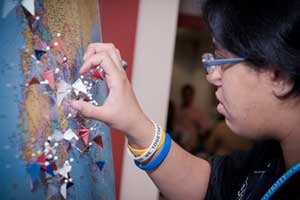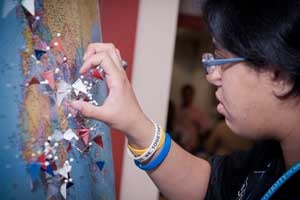 KINGSTON, R.I. – June 2, 2014 – At least two instances of violence were prevented in Southeastern Nigeria because one man applied the methods he learned at the University of Rhode Island’s Center for Nonviolence and Peace Studies.
KINGSTON, R.I. – June 2, 2014 – At least two instances of violence were prevented in Southeastern Nigeria because one man applied the methods he learned at the University of Rhode Island’s Center for Nonviolence and Peace Studies.
Amos Ogbonnaya participated in the center’s International Nonviolence Summer Institute, and prevented revenge attacks within the past year in his town of Okota in the bustling port city of Lagos. The community chief and lawyer is returning June 9 to learn how to train others in conflict resolution.
He is one of 70 participants from 17 countries from Nepal to Zimbabwe attending the increasingly popular Summer Institute. Fifty-seven people will be learning Kingian Nonviolence from June 2 to 6. During the second week, June 9 to 13, another 11 people will become certified to teach others to become conflict resolution trainers in their home countries.
“Some of them have put themselves at risk for basic human rights,” said Paul Bueno de Mesquita, director of URI’s center, noting that two participants from Pakistan have been jailed for supporting minority Christians who are targeted for violence in the Muslim country. “The fact that they journeyed here from sometimes life-threatening circumstances to establish basic human rights is incredible.”
The second week of training will be led by distinguished visiting scholar Bernard Lafayette Jr., Ed.D., a confidante of Martin Luther King Jr. and civil rights activist, minister and lecturer who has conducted nonviolence training across the globe. Lafayette, founder and former director of the URI center, was awarded an honorary degree at URI’s recent commencement.
Ogbonnaya, 47, says that at one time, he would have been in favor of revenge, but he has changed, and the Summer Institute provided him with conflict resolution strategies.
“Shortly after I returned to Nigeria from URI in June 2013 violence erupted between my community and a neighboring community over a jointly owned community market,” Ogbonnaya wrote in an email.
“An urgent meeting of all village heads and community chiefs was summoned by the traditional prime minister of my community, to take up the weighty decision of whether to go to war with our neighboring community, Onicha, for destroying our section of the market without any known cause. As a chief and community leader I had to speak out against going to war, not because I was afraid of war but that there are more effective ways to resolve the conflict than war.”
He suggested that a delegation visit the chief of the hostile community to seek explanations on the unwarranted attack. Many saw his recommendation as cowardice.
The chief turned down his suggestion for negotiation. To avert further escalation of the conflict, he quickly petitioned the state government for an all-stakeholders conference.
The governor’s office convened the conference and compelled the king and chiefs of both communities to attend; an accord was reached, Ogbonnaya said.
Not only were his compatriots surprised at the success of his strategy, but also, “They were more shocked by my change of attitude and approach because in the past I would be the one to mobilize the youths for war.”
Stories such as Ogbonnaya’s will be presented by participants on June 5 from 7 to 9 p.m. in the Multicultural Center.
According to Bueno de Mesquita, a professor of psychology, the institute provides a framework for conflict management, mediation, and ultimately reconciliation.
“The purpose of these trainings is to develop nonviolent leaders, expose people to nonviolent concepts, and to develop schools that would be helpful in cultivating a nonviolent society,” Bueno de Mesquita said.
“We are having an important global impact preparing grassroots and organizational leaders and activists who are creating significant changes in their communities and home countries,” Bueno de Mesquita said.
Under the direction of Bueno de Mesquita, the Silvia-Chandley Professor of Nonviolence and Peace Studies (2010-2012), the URI Center has emerged as one of the only university-based programs in the world offering Kingian Nonviolence conflict reconciliation training.
Pictured above
Seventeen countries are represented at the 13th International Summer Nonviolence Institute at the URI Center for Nonviolence and Peace Studies. A participant from 2013 places a pin on a global map.
Marketing & Communications photo by Michael Salerno Photography.

